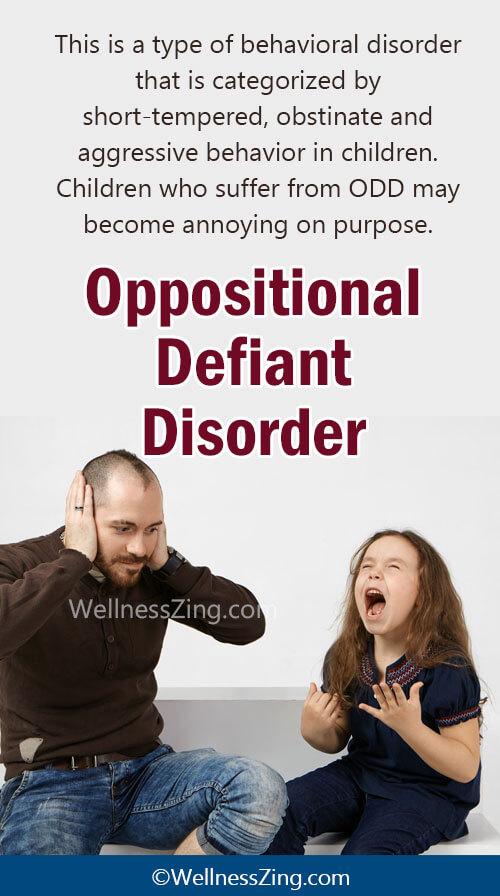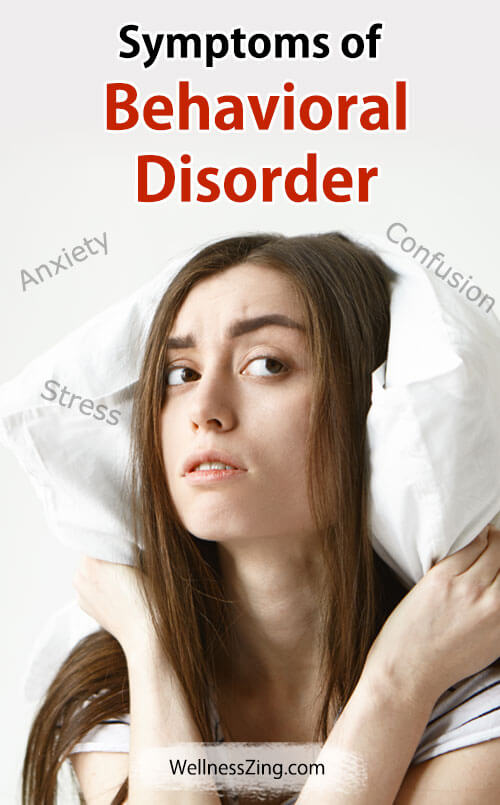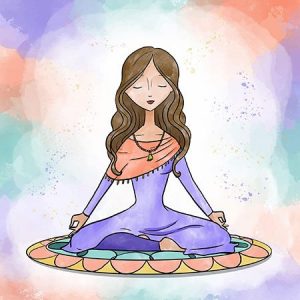Behavioral issues is one of the main signs that requires evaluation of mental health and treatment. This disorder starts from the childhood. When it is not treated at the early stage then it affects the relationships of a person. Behavior disorder is mostly seen in adults where they are not able to either maintain a job and / or their relationships – be it personal, social or professional.
In this article, we will talk about the causes, symptoms, diagnosis and treatment of this disorder.
What is Behavior Disorder?
Behavior is defined as the way how your body acts or reacts to an outside environment or to the inside emotions, and thoughts.
People who have behavioral disorders shows persistent symptoms or repetitive behaviors that are abnormal, disruptive, and inappropriate in nature.
It can lead to aggression, rebelliousness, criminal behavior, substance use, resentment, unfitting sexual behavior, distraction, clandestineness, and self-destruction. It has been found that around thirty percentage of children are identified with this kind of disorder before they start their school.
The symptoms of behavioral disorder are closely related to the symptoms of attention-deficit hyperactivity disorder, and autism. Where in children, lead poisoning is a potential reason for the occurrence of behavior disorder, in adults, traumatic brain injury, substance abuse, psychiatric ailments and medical disorders are the major reasons for it.
Behavioral symptoms are generally the result of a chronic medical condition that can lead to a life-threatening complication such as suicide, injury, or self-sabotage.
Causes Of Behavioral Disorder
A behavioral disorder can be caused due to biological factors or due to peer-related issues.
Some of the biological reasons include:
- Physical illness
- Personality disorders
- Substance abuse
- Child abuse
- Mental illness like schizophrenia, structural abnormalities in brain, abnormal brain chemistry, conduct disorder, dementia etc.
- Traumatic incidence
- Malnutrition
- Damage, or injury to brain in the childhood
- Hereditary issues
- Autism
- cognitive diseases
- Intermittent explosion
- Post-traumatic stress due to mental trauma, or physical trauma that includes bone deformity, eye injuries, burns, and other types of injuries
- Brain tumors
- Lead poisoning
- Neonatal infection
Family issues can also contribute to this disorder. Some of these can be:
- Divorce
- unstable relationships
- Family history
- Being emotionally upset
- Intimidation from parents
- Unhealthy lifestyle
- Unstable home life
- Lack of supervision
- Ignorance towards education or studies
- Inconsistent discipline
If a person shows persistent behavioral signs that you need to get quick medical consultation and treatment.
Types of Behavioral Disorders
Behavioral disorder can happen in several types in a person such as
- ADHD or Attention Deficit Hyperactivity Disorder
- Emotional disorders
- Anxiety disorders
- Persistent developmental disorders
- Dissociative disorders
- Disruptive behavioral disorders
1. ADHD
This is a condition where a person loses the ability to focus or control his impulsive behavior. Due to which he/she can become overactive. ADHD or Attention Deficit Hyperactivity Disorder is mostly seen in boys as compared to girls.
2. Emotional Behavioral Disorder
In this type of behavioral disorder, a person could not control his/her emotions. He loses his ability to be happy. Children, or adults with emotional behavioral disorder are often noticed to face difficulties while paying attention to a certain thing.
In other words, they have a very short attention span. They get disinterested very easily, and quickly. Some of the signs of an emotional behavioral disorder are:
- Inappropriate actions under normal situations
- Difficulties in learning
- Difficulty maintaining interpersonal relationships, that includes relations with peers, and teachers
- Feeling depressed, and unhappy
- Anxiety and fear related to any personal incident
3. Oppositional Defiant Disorder
Oppositional Defiant Disorder is mostly observed among children. This is another type of behavioral disorder that is categorized by short-tempered, obstinate, and aggressive behavior in children. Children who suffer from ODD may become annoying on purpose. They channelize their adverse actions at authority members. Such children cause more troubles to others than themselves.
While researchers still do not know the main causes behind the origin of this disorder, there are two main theories that can reveal the causes. These are – 1) Developmental Theory and 2) Learning Theory.
Developmental Theory : According to this theory the problem of ODD begins at the early age when a child is still a toddler. Children affected with this disorder have trouble learning to become independent from their parents or caretakers with whom they are emotionally attached. At times this disorder can be termed as a normal developmental issue that may last beyond the toddler years of a child.
Learning Theory : As we all know that children learn many things from their parents or guardians. They imitate the behavior and actions of their elders. Children may learn the negative attitude of the person in charge or in power. Children with this disorder may learn to be stubborn or throw tantrums to get what they want (things or attention) as they learn it from their parents.
4. Anxiety Disorder
Feeling anxious on an occasional basis is not a matter of concern. Things become serious when this normal emotion occurs on a frequent basis, or it becomes persistent. In some people, anxiety can interfere with the daily lives of people and can cause insomnia. It negatively impacts their performance at school, or work level. Anxiety disorders are chronic mental health conditions that needs immediate treatment.
5. Obsessive-Compulsive Disorder
This type of disorder is characterized by irrational thoughts and fears that causes obsession and compulsion in people. A person who suffers from OCD, can engage in repetitive, and compulsive behavior.
These repetitive acts give them relief from stress on a temporary basis. They are not aware of the damaging outcome of their unusual actions. Performing these actions do nothing more than relieve stress temporarily.
Symptoms of Behavioral disorder or Behavioral Issues
The symptoms of Behavioral disorder vary based on the type of behavioral disorder. The effects of it is not just limited to the behavior of the person, but destroys the functioning of the entire body system.
Let us see how behavioral disorder symptoms affect the brain
- Anxiety,
- Irritability
- Confusion,
- Nervousness
- Restlessness
- Forgetfulness
- Detachment
- Difficulty in understanding
- Difficulty with thinking, memory, writing, comprehension, talking, and reading
- Hallucinations
- Delusions
- Feelings of being misunderstood, and mistreated
- Feeling empty and worthless
- Frequent mood swings from elevation to depression
- Poor judgment
Behavioral disorder symptoms can impact other parts of the body in following ways:
- Pain or cramps in the abdomen
- Changes in appetite
- Changes in Bowel movement
- Headache
- Fever,
- Skin rashes,
- Burnt fingertips
- Bloodshot eyes
- Blurred vision
- Delay in the growth of children
- Shaking
- Poor hearing abilities
- Impaired coordination, and balance in the body movements
- Experiencing jerk, contraction, and weakness in muscles
- Sensory changes
- Poor quality sleep
- Inability to swallow food
- Changes in body weight
Emotional impact of Behavioral Disorder Symptoms
People who have a behavioral disorder are seen to display emotional distress in varying ways, that differs from one person to another.
- Quickly get nervous or angered
- Often look agitated
- Tendency to hold the other person responsible for the mistake
- Disobeys rules or probe authority
- Frequently engage in arguments
- Throw temper tantrums
- Not able to handle frustration
Serious symptoms of behavioral disorder
In a few cases, behavioral disorder symptoms can even turn out to be a life-threatening condition such as intimidating, aggressive, suicidal, or illogical behavior. They can be a danger to not just oneself. Looking at the severity of this disorder, it should be addressed and seek treatment quickly. Some of these serious symptoms include:
- Sudden commencement of changes in mental status due to toxicity or illness
- Alcohol addiction, drug intoxication or their withdrawal
- Severely low blood sugar
- Elevated energy levels and mood
- Meningitis
Effects of a Behavioral Disorder
Without proper and effective treatment, behavioral disorder can result in damaging short-term and long-term impact on the personal as well as professional life of the person. Initiation of fights, arguments, bully, etc. with authority figures, abuse of animals, threatening with weapons, etc. are the commonly seen behavior in such people.
Loss of job, separation in marriages due to strained relations, etc. are mostly seen in adults, while children with such disorder are often seen in switching schools due to their bad behavior.
Risk Factors Involved For Behavior Disorder
People who suffer from severe mental illness are at higher risk to develop behavior disorder than the ones who do not exhibit these conditions. In some cases, it can also be related to the genetics of a person.
Family situations is also a major factor that can make you more susceptible to behavioral disorder. If any of your parents, or both have the problem of problem behavior, then they are more prone to passing it to their children.
People who have the below-mentioned disorders are at high risk of developing behavioral disorder.
- anti-social disorder
- mood disorder
- ADHD
- schizophrenia, and
- substance abuse
Ways To Seek Medical Assistance For Problem Behavior
You need to consult your doctor if you or your loved one experiences the below signs:
- if you notice that your behavior has been the sole reason for ruined relations with people at school, or at the workplace
- exhibiting criminal behavior
- being cruel to animals
- engaging in frightening, harassment, or impetuous behaviors
- excessive feelings of loneliness or seclusion
- showing low interest in work or school
- withdrawal from society
People who suffer from problem behavior and display above signs generally do not get along with others. They feel themselves different from others. They feel as though others do not understand them. This leads to frustration and development of problem behavior symptoms in them.
If you can relate to the below symptoms of behavior disorder, then it is an indication of a medical emergency.
- anticipating suicide
- hearing voices
- hurting oneself or others
- fear of violence
On noticing any of these signs in yourself, or your loved ones, you need to rush to the doctor and get immediate treatment.
Diagnosis Of Behavioral Disorder or Behavioral Issues
The treatment of problem behavior begins with effective diagnosis. Your doctor will ask about the health history and learn about the symptoms of child, or an adult to confirm this condition. The answers to these questions provide him the much-needed information about the causes and severity of problem behavior.
- How do you feel about your relationship with your family members?
- When did the behavior initiated within you?
- Till when did it last?
- How does your behavior affect you and the people around you?
- What type of situations in your life triggers this behavior in you?
- What type of behavioral disorder symptoms have you noticed?
- How the symptoms cause disturbance at home, at work, or in school?
- Have they led to any legal, or financial troubles?
- Who do you hang out with often?
- What activities do your like to do the most in your free time?
- What type of medications are you currently taking?
- Are you consuming alcohol, or any illegal drugs?
In addition to the above questionnaire, doctors can even conduct functional behavioral evaluation to address behavioral issues in students. These evaluations are based on several strategies, and techniques for identification of problem behaviors. These assessments can also include opinion of teachers, and parents to understand more about the issue in the child.
Complications Of Behavioral Disorder Symptoms
Failing to get the timely treatment can lead to development of serious complications in a person. In some cases, it can even result in permanent damage of brain. It is important to follow the treatment methodology and prepare a medical treatment to lower the potential dangers of complications due to behavioral disorder:
- brain damage,
- loss of memory
- difficulties in attention,
- impaired judgment
- delay in development
- difficulties in maintaining relations at work, school, social settings etc.
- Use and abuse of alcohol, and drugs
- chances of getting injured
- violation of law
- self-destruction
- social seclusion
- violence
- suicide
Treatment of Behavioral Issues
After learning about the cause of behavioral disorder, your doctor will formulate the treatment to relieve from its symptoms effectively. People who show serious signs of disorder are at risk to harm themselves. An inpatient accommodation at a hospital is advised for personal safety. In addition to inpatient stay, your doctor can advise come additional treatments to treat problem behavior:
Therapy
- conflict resolution training sessions
- counseling
- medications
- group therapy, and
- parenting skills classes
Medication
Your doctor can also prescribe some medicines that aims at changing and managing the behavior of a person. These drugs can provide a relief to child from anxiety disorder, ADHD, OCD etc. These medicines, and antidepressants aims at reducing impulsivity, hyperactivity, obsessive-compulsive actions and depression in a person. They can assist your child to concentrate better, and lower motor impatience, and impulsive behavior.
Conclusion
Behavior disorder can take a very severe form, and can adversely harm each and every sphere of life. Early detection and treatment are necessary to cure the issue before it causes a major destruction in your life. Cognitive behavioral therapy with medication is proved to be an effective way for the treatment of ODD disorders. The sooner you obtain assistance, the easier it will become to restore normalcy in your behavior and life.
If you liked this post, then do share it with your friends on social media. Also, you can write to us any of your queries, suggestions, and comments. We will be happy to address them soon.




















